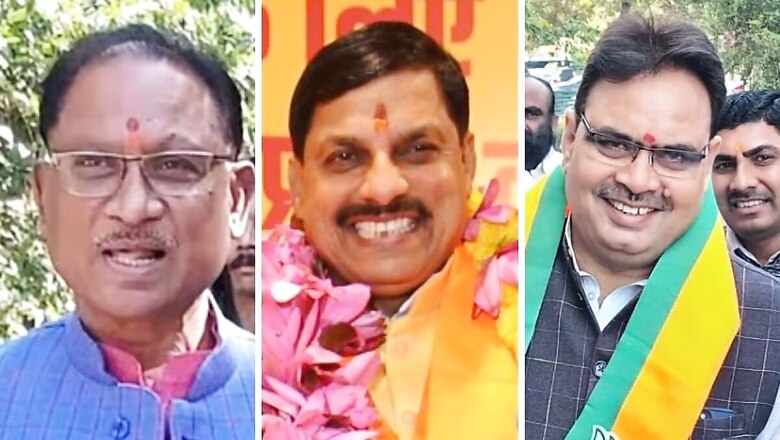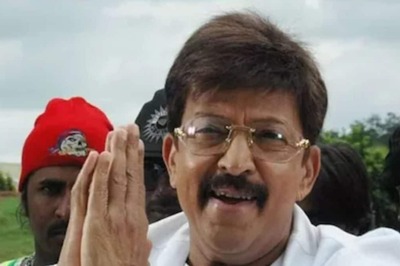
views
Bhajanlal Sharma as the Chief Minister for Rajasthan, Mohan Yadav for Madhya Pradesh, and Vishnu Deo Sai for Chhattisgarh. As the Bharatiya Janata Party (BJP) surprised all, including its members, senior leaders claim that it has also been a way of breaking political stereotypes.
All three of them are going to be first-time chief ministers. One is from a tribal community, another from the Other Backward Class (OBC), while the other is from general caste. Apart from the political identities of being a regular leader in the party, three of them share a common thread. All of them were groomed by the Rashtriya Swayamsevak Sangh (RSS). At least two of them — Yadav and Sharma — are from the RSS’s student wing, Akhil Bharatiya Vidyarthi Parishad (ABVP).
Hours after his name was announced as the chief minister-designate of the state, Vishnu Deo Sai, Chhattisgarh’s first tribal leader to get such a position, reached the RSS headquarters of the state in Raipur. His ideological commitment towards the Sangh and its influence on him have always been out in the open for people and politicians to see.
In a similar fashion, after the announcement of Mohan Yadav’s name as the chief minister of Madhya Pradesh last evening, the senior functionaries of the RSS and the volunteers in the state celebrated. Yadav, who started his political career as the national secretary of ABVP, has always been seen in the BJP as a Sangh volunteer, an able organiser and a disciplined politician.
The senior leadership of the BJP, in another surprise, announced Bhajanlal Sharma’s name as the chief minister of Rajasthan. Sharma, a first-time MLA, also has a strong connection with the RSS. He was an important leader of the ABVP in Rajasthan and rose through ranks in the BJP later.
Apart from Sai, who has been an intricate part of the RSS unit in Chhattisgarh, the elevation of Yadav and Sharma also shows how Sangh volunteers who rose through the ranks in the ABVP have been finding their space in larger state and national politics.
Dattatreya Hosabale, who is from the ABVP, is now the general secretary of the RSS. Sunil Ambekar, another senior member of the ABVP, now holds charge as a national spokesperson. Amit Shah and JP Nadda, who rose from the ABVP, now hold the positions of Union Home Minister and national president of BJP, respectively.
RSS-ABVP MEN RISING
News18 has learnt that the names of Sai, Sharma and Yadav for the post of CM were pushed by the RSS. Sai’s tribal outreach and his contribution towards the reconversion or Ghar Wapsi of tribals from Christianity to Hinduism worked in his favour as it has been a crucial issue for the RSS for long.
To stop conversion, the RSS also advocated for an anti-conversion law in Chhattisgarh, although Raman Singh’s government resisted such a legislation, citing development as the only election ploy.
In Yadav’s case, the RSS seniors felt that it was time that the largest state got an OBC chief minister, who is loyal to the RSS ideas.
The elevation of a Swayamsevak (volunteer), who has been known as a rooted but firebrand tribal leader, and two ABVP leaders, one of whom comes from the OBC community, served two purposes of the RSS and BJP. “It further blunts senior Congress leader Rahul Gandhi’s attack on the RSS-BJP, calling it anti-OBC and pro-upper caste party and his ‘weapon’ — caste census," said a senior RSS functionary. Secondly, it motivates the BJP workers and RSS volunteers across levels to be ideologically loyal to the RSS.
















Comments
0 comment